Zimbabwe
The Republic of Zimbabwe is a country in the southern part of the continent of Africa. Its capital city is Harare.
Republic of Zimbabwe | |
|---|---|
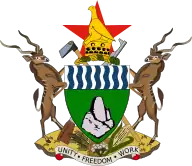 Coat of arms
| |
| Motto: "Unity, Freedom, Work"[1] | |
| Anthem: Simudzai Mureza wedu WeZimbabwe (Shona) Kalibusiswe Ilizwe leZimbabwe (Sindebele) Blessed be the land of Zimbabwe[2] | |
.svg.png.webp) | |
| Capital and largest city | Harare |
| Official languages | |
| Ethnic groups (2003) |
|
| Demonym(s) | Zimbabwean |
| Government | Semi-presidential republic |
| Emmerson Mnangagwa | |
| Constantino Chiwenga | |
| Legislature | Parliament |
| Senate | |
| House of Assembly | |
| Independence from the United Kingdom | |
• Declared | 11 November 1965 |
• Recognised | 18 April 1980 |
• Constitution of Zimbabwe | 15 May 2013 |
| Area | |
• Total | 390,757 km2 (150,872 sq mi) (60th) |
• Water (%) | 1 |
| Population | |
• 2016 estimate | 16,750,327[4] (72nd) |
• Density | 26/km2 (67.3/sq mi) (170th) |
| GDP (PPP) | 2013 estimate |
• Total | $7.731 billion[5] |
• Per capita | $589[5] |
| GDP (nominal) | 2013 estimate |
• Total | $10.978 billion[5] |
• Per capita | $837[5] |
| Gini (2009) | 50.1[6] high |
| HDI (2015) | low · 154th |
| Currency | variousa |
| Time zone | UTC+2 (Central Africa Time) |
| UTC+2 (not observed) | |
| Driving side | left |
| Calling code | +263 |
| ISO 3166 code | ZW |
| Internet TLD | .zw |
| |
Geography
Zimbabwe is surrounded by other countries, and so it has no coast on the sea. This type of country is called landlocked. The countries that surround Zimbabwe are Zambia, Botswana, South Africa and Mozambique.
Zimbabwe is home to the famous waterfall, Victoria Falls, which are a feature of the river Zambezi and also the Great Zimbabwe, the ancient architectural monument from which the country was named after.
Vegetation (Fauna and Flora)
The country is mostly savanna. In the east it is moist and mountainous with tropical evergreen and hardwood forests. Trees include teak and mahogany, knobthorn, msasa and baobab. Among the many flowers and shrubs are hibiscus, spider lily, leonotus, cassia, tree wisteria and dombeya.
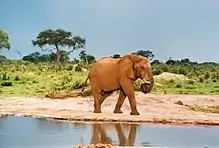
There are around 350 species of mammals in Zimbabwe. There are also many snakes and lizards, over 500 bird species, and 131 fish species.
History
The area that is now Zimbabwe was added to the British Empire around 1890. Zimbabwe is also known by its old name of Rhodesia. In 1965, it became an independent country when Prime Minister Ian Smith announced the Unilateral Declaration of Independence(U.D.I). The government was mostly controlled by the white population, similar to South Africa at the time. African citizens were given full equality in 1980, and the country's name was officially changed to Zimbabwe. Robert Mugabe led the country as the Prime Minister and President for 37 years. Though Mugabe was elected fairly at first, he became a dictator, and had put in place a number of cruel and disastrous laws. On November 21, 2017, Mugabe resigned as President of Zimbabwe.[9]
Language
The country Zimbabwe has a mixture of languages; Shona, Ndebele, Venda, Manyika, Nyanja, Chagani, and a unique-unified Zimbabwean English.
Economy
Zimbabwe uses the currencies of several other countries. The government uses the United States dollar. The economy is currently in a bad situation. Foreign currency reserves are at very low levels, and the Zimbabwean Dollar has become very devalued. Just recently, three zeroes were taken off the Zimbabwean dollar (for example, $1,000,000 (one million dollars) would become $1000 (one thousand dollars)). Many observers link this to Mugabe's controversial Land Reform programme.
- Agriculture: Most people in Zimbabwe work in the field of agriculture: cattle, poultry, pigs, vegetables, millet, sorghum, maize, rice, cassava, tea, coffee, groundnuts, cotton, wheat, sugar cane, timber.
- Mining: Copper, silver, tin, coal, nickel, cobalt, gold, iron ore, asbestos, chrome.
- Manufacturing: Iron, steel, food processing, textiles, brewing, wood, furniture, tobacco.
- Other: Tourism centring on the Victoria Falls and the game parks
2017 coup d'état
On November 15, 2017, President Robert Mugabe was placed under house arrest[10] as Zimbabwe's military took control in a coup.[11] On November 21, 2017, Mugabe resigned the Presidency.
Provinces
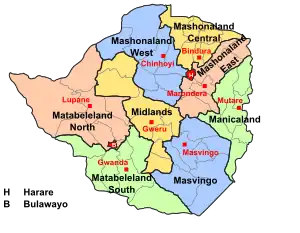
Zimbabwe is divided into 8 provinces and 2 cities that are the same as a province.
| Province | Capital |
|---|---|
| Bulawayo | Bulawayo |
| Harare | Harare |
| Manicaland | Mutare |
| Mashonaland Central | Bindura |
| Mashonaland East | Marondera |
| Mashonaland West | Chinhoyi |
| Masvingo | Masvingo city |
| Matabeleland North | Lupane District |
| Matabeleland South | Gwanda |
| Midlands | Gweru |
Cities
The largest cities are:
| Cities in Zimbabwe | |||||||
| Rank | City | Population | Province | Image | |||
| Census 1982 | Census 1992 | Census 2002 | Est. 2007 | ||||
| 1. | Harare | 656,011 | 1,189,103 | 1,444,534 | 1,607,022 | Harare | 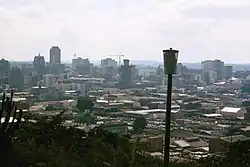 |
| 2. | Bulawayo | 413,814 | 621,742 | 676,787 | 713,340 | Bulawayo | 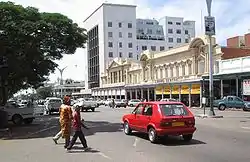 |
| 3. | Chitungwiza | 172,556 | 274,912 | 321,782 | 352,204 | Harare | |
| 4. | Mutare | 69,621 | 131,367 | 170,106 | 193,629 | Manicaland | 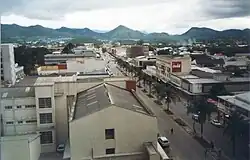 |
| 5. | Gweru | 78,918 | 128,037 | 141,260 | 148,935 | Midlands | |
| 6. | Kwekwe | 47,607 | 75,425 | 93,072 | 103,210 | Midlands | 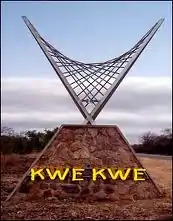 |
| 7. | Kadoma | 44,613 | 67,750 | 76,173 | 81,008 | Mashonaland West | 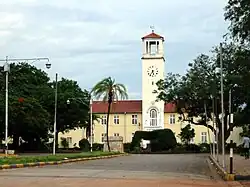 |
| 8. | Masvingo | 30,523 | 51,743 | 69,993 | 80,630 | Masvingo | |
| 9. | Chinhoyi | 24,322 | 43,054 | 56,794 | 65,109 | Mashonaland West | |
| 10. | Marondera | 19,971 | 39,384 | 52,283 | 60,291 | Mashonaland East | |
Sports
Football is the most popular sport in Zimbabwe. Rugby union and cricket are also popular. Zimbabwe has won eight Olympic medals.
Zimbabwe has also done well in the Commonwealth Games and All-Africa Games. Kirsty Coventry won 11 gold medals in swimming.[12][13][14][15] Zimbabwe has also been at Wimbledon and the Davis Cup in tennis. Zimbabwe has also done well in golf. Other sports played in Zimbabwe are basketball, volleyball, netball, and water polo, as well as squash, motorsport, martial arts, chess, cycling, polocrosse, kayaking and horse racing. Most of these sports don't have international representatives but instead stay at a junior or national level.
References
- "Zimbabwe". The Beaver County Times. 13 September 1981. Retrieved 2 November 2011.
- CIA (2011). "The World Factbook – Zimbabwe". 2011. Central Intelligence Agency. Archived from the original on 16 April 2020. Retrieved 2 November 2011.
{{cite journal}}: Cite journal requires|journal=(help) - The following languages, namely Chewa, Chibarwe, English, Kalanga, Koisan, Nambya, Ndau, Ndebele, Shangani, Shona, sign language, Sotho, Tonga, Tswana, Venda and Xhosa, are the officially recognised languages of Zimbabwe. (CONSTITUTION OF ZIMBABWE (final draft) Archived 2013-10-02 at the Wayback Machine).
- "Population 2016 Country Ranks". Countries of the World. Retrieved 15 October 2012.
- "Zimbabwe". International Monetary Fund. Retrieved 24 April 2012.
- "Human Development report". UNDP. Archived from the original on 17 October 2009. Retrieved 15 April 2010.
- "2016 Human Development Report" (PDF). United Nations Development Programme. 2016. Retrieved 21 March 2017.
- "Zimbabwe Currency". Wwp.greenwichmeantime.com. Archived from the original on 19 July 2011. Retrieved 21 August 2011.
- "Zimbabwe's President Mugabe 'resigns'". BBC News. 2017-11-21. Retrieved 2017-11-21.
- "Robert Mugabe 'under house arrest'". BBC News. 2017-11-15. Retrieved 2017-11-15.
- "Robert Mugabe 'under house arrest'". BBC News. 2017-11-15. Retrieved 2017-11-15.
- "2004 Olympic Games swimming results". CNN. Archived from the original on 9 May 2006. Retrieved 22 July 2007.
- "Montreal 2005 Results". Archived from the original on 28 January 2007. Retrieved 9 June 2007.
- "12th FINA World Championships". Archived from the original on 6 June 2007. Retrieved 9 June 2007.
- "BBC Sport Commonwealth Games 2002 Statistics". BBC News. Retrieved 29 August 2007.

.svg.png.webp)